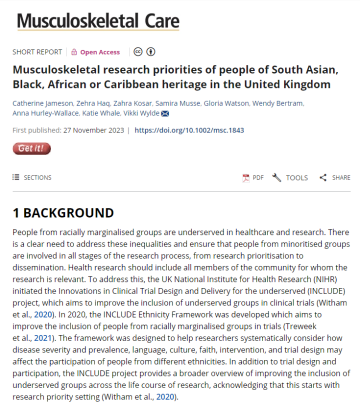Setting research priorities with under-served communities
Theme Surgical and orthopaedic innovation
Workstream Interventions to improve patient outcomes after surgery
Status: This project is complete
This project focused on ensuring the research we conduct addresses the needs and priorities of people from racially marginalised backgrounds.
Project aims
This project aimed to address inequalities and ensure that traditionally underserved people are involved in all stages of the research process, including setting the research agenda. To identify orthopaedic research priorities, we worked with Bristol-based community groups attended by people of South Asian, Black, African or Caribbean heritage.
Our overall aim was to co-produce a list of prioritised research questions for orthopaedic research to reflect the needs and voices of people from racially marginalised backgrounds.
What we did
We spent time establishing trust and relationships with local community groups which led to the co-production of the Checklist for Inclusive Community involvement in health research (CHICO). The checklist provides guidance structured into three stages: building relationships, reciprocal relationships, and practicalities. We followed the checklist to guide our priority setting activities during this project.
Three Bristol-based community groups were involved in the research priority setting.
- Dhek Bhal – a charity providing weekly group meetings for older members of the local South Asian community
- Malcolm X Elders – a weekly drop-in community group for African Caribbean elders
- My Friday Coffee Morning – a weekly drop-in coffee morning facilitated by two local community members and attended by local women of Black, African or Caribbean heritage
Researchers met with each group. They explained that the project was aimed at finding out what was important for each community in terms of bone, joint and muscle health. This was followed by an open discussion.
What we found and what this means
We co-produced a list of 23 musculoskeletal research questions that we hope reflect the priorities and experiences of people of South Asian, Black, African or Caribbean heritages living in the United Kingdom.

Topics related to musculoskeletal health that weren’t research questions were developed into a separate list of five service improvement topics. We are planning on feeding these back to the Bristol Orthopaedic Trust and Bristol, North Somerset and South Gloucestershire Integrated Care Board (funders of this project).
Research questions ranged from issues such as how to stop joint replacement operations being cancelled and how long a shoulder replacement will last to queries about self-management and genetic testing to assess risk.
Areas for service improvement focused on discharge planning and provision of home care as well as the accessiblity of physiotherapy services and language barriers stopping people accessing primary care.

By involving people from racially marginalised communities in research priority setting, we can better understand their health needs and concerns and design research that is relevant and addresses unmet needs.
What next
We will use the priorities we identified to inform our work within the surgical and orthopaedic innovation theme.
We will also focus on developing accessible and inclusive co-interventions to address unmet needs, optimise patient care and improve outcomes.
